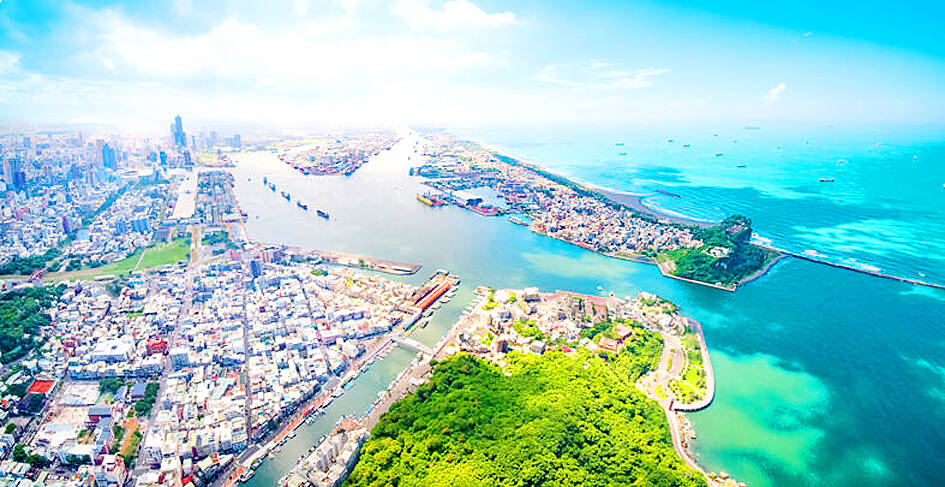Taiwan is again on the Tokyo Memorandum of Understanding (Tokyo MOU) whitelist this year, the Maritime and Port Bureau said.
The nation, which has been on the whitelist for eight consecutive years, rose from 14th place last year to sixth place this year, the best ranking Taiwan has achieved so far, the bureau said.
The Tokyo MOU is an agreement among 21 nations in the Asia-Pacific region aimed at eliminating substandard shipping through a system of port inspections. It was signed in 1993 and is one of the key regional MOUs under the International Maritime Organization (IMO).

Photo courtesy of Taiwan International Ports Corp
Ships from countries on the whitelist are considered lower-risk vessels, require fewer and less frequent inspections, and have a good reputation for compliance.
The US Coast Guard also recently released its annual report, in which Taiwan was once again named a quality flag state, with no record of detained vessels, the bureau said.
All foreign ships arriving at US ports are randomly inspected by the US Coast Guard based on its own risk assessment system, it said.
The US Coast Guard has its own vessel inspection and rating mechanism, separate from other port state control organizations.
Maritime and Port Bureau Director-General Yeh Hsieh-Lung (葉協隆) said that maritime transport plays a critical role in Taiwan’s economic development.
“We remain committed to ensuring the safety and environmental performance of Taiwan-flagged vessels operating in international waters,” he said.
“We would also actively promote the implementation of various conventions adopted by the IMO, continuously enhancing the management efficiency of Taiwan’s merchant fleet and fulfilling our international responsibilities through concrete actions,” he added.

Eight restaurants in Taiwan yesterday secured a one-star rating from the Michelin Guide Taiwan for the first time, while three one-star restaurants from last year’s edition were promoted to two stars. Forty-three restaurants were awarded one star this year, including 34 in Taipei, five in Taichung and four in Kaohsiung. Hosu (好嶼), Chuan Ya (川雅), Sushi Kajin (鮨嘉仁), aMaze (心宴), La Vie by Thomas Buhner, Yuan Yi (元一) and Frassi in Taipei and Front House (方蒔) in Kaohsiung received a one-star rating for the first time. Hosu is known for innovative Taiwanese dishes, while Chuan Ya serves Sichuan cuisine and aMaze specializes

STATS: Taiwan’s average life expectancy of 80.77 years was lower than that of Japan, Singapore and South Korea, but higher than in China, Malaysia and Indonesia Taiwan’s average life expectancy last year increased to 80.77 years, but was still not back to its pre-COVID-19 pandemic peak of 81.32 years in 2020, the Ministry of the Interior said yesterday. The average life expectancy last year increased the 0.54 years from 2023, the ministry said in a statement. For men and women, the average life expectancy last year was 77.42 years and 84.30 years respectively, up 0.48 years and 0.56 years from the previous year. Taiwan’s average life expectancy peaked at 81.32 years in 2020, as the nation was relatively unaffected by the pandemic that year. The metric

Taiwan High Speed Rail Corp. (THSRC) plans to ease strained capacity during peak hours by introducing new fare rules restricting passengers traveling without reserved seats in 2026, company Chairman Shih Che (史哲) said Wednesday. THSRC needs to tackle its capacity issue because there have been several occasions where passengers holding tickets with reserved seats did not make it onto their train in stations packed with individuals traveling without a reserved seat, Shih told reporters in a joint interview in Taipei. Non-reserved seats allow travelers maximum flexibility, but it has led to issues relating to quality of service and safety concerns, especially during

A magnitude 5.1 earthquake struck Chiayi County at 4:37pm today, the Central Weather Administration (CWA) said. The hypocenter was 36.3km southeast of Chiayi County Hall at a depth of 10.4km, CWA data showed. There were no immediate reports of damage resulting from the quake. The intensity of the quake, which gauges the actual effect of a seismic event, measured 4 in Chiayi County, Tainan and Kaohsiung on Taiwan's seven-tier intensity scale, the data showed. The quake had an intensity of 3 in Chiayi City and Yunlin County, while it was measured as 2 in Pingtung, Taitung, Hualien, Changhua, Nantou and Penghu counties, the data